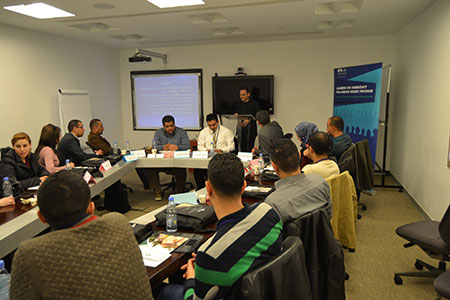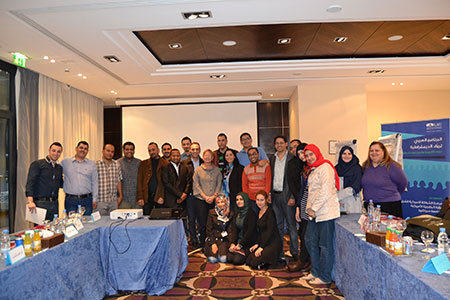- English
- عربي
News and Events
Week 1 Report
Summary of the first week of Leaders for Democracy (LFD) 2015 Program
by Angie Al Tokhy
The first week of the LFD was filled with events. Student activities varied from attending lectures to field trips to Lebanon’s most important and notable landmarks which made the first week quite eventful and productive.
On the first day of the LFD activities, Monday February 2015 ,23 the participants started with an introductory lecture presented by Dr. Imad Salamey, Political Science and International Affairs Professor at the Lebanese American University (LAU) in Beirut who is also the President of the Center for Arab Research and Development (CARD) as well as being an Executive Board Member of the Institute for the Study of Conflict, Security and Development (CSDS) at Richmond American International University in London.
The opening remarks of Dr. Salamey at LAU focused on the importance of the program and its role in developing the skills of the Arab youth to prepare them to become leaders of the future and introduce change in their countries. Then, he presented a brief overview of the planned activities of the program that would last 10 weeks, he also introduced the participants to the program manager, Dr. Walid Touma, Assistant Professor in the Business Administration College. The second lecture, also conducted by Dr. Salamey was a comprehensive overview of the program, the reason behind the choice of participants and the bases for said choice. The participants interacted with Dr. Salamey who emphasized that the LFD program would include field trips to Lebanon’s most notable touristic and historical landmarks and that the program will ensure the recruitment of notable writers, historians and politicians to conduct lectures for the audience. The first day ended with a tour for the participants inside the campus of the LAU where they were presented with the most significant activities taking place on-campus.

The second day was different. It was inaugurated by the Lebanese writer and poet Henry Zougheib with his lecture about the Lebanese Culture and Heritage. The lecture was structured around six major points: a distinctive nation cannot be evaluated based on its land mass or demography, rather by its citizens’ contribution to civilization; since the beginning of times Lebanon has been known for its people; he introduced the Lebanese cities that contributed greatly to human civilization; the greatest Lebanese personalities; the four Lebanese monu- ments; the knowledge that distinguish the Lebanese people; the tangible and intangible Leba- nese heritage listed on the United Nations Educational, Scientific and Cultural Organization (UNESCO) World Heritage List. Zougheib began with a historical overview of the Lebanese culture and its contribution to the ancient and modern world in terms of the great intellectuals, prominent figures in philosophy, mathematics and poetry. He presented a section titled “Pages from Lebanon; The History, Culture and Heritage” and another section on “Lebanon the Oasis of Six leading Bestowments in History” through which he underscored that Lebanon was the first to introduce the world to the alphabet and philosophy of the Stoics, the Atom and philoso- phy of Neo Democracy. In addition, Zougheib highlighted yet another point about the seven Lebanese cities considered to be the pillars of thought in the world, they are: Tripoli, Byblos, Beirut, Sidon and Tyre, Qana and Baalbek; furthermore, there are 11 great Lebanese who greatly impacted the entire world; he also spoke about the most important contributions of Lebanese journalists to the Egyptian press. The lecture witnessed a great deal of interaction from the audience who posed questions regarding Zougheib’s discussion on the importance of the Koran as a language even for non-Muslims and that the Phoenician culture preceded the civilization of the Pharaohs in their knowledge of the burial of the dead and embalmment.
The following lecture was hosted by the logistics and training coordinator of the LFD program, Professor Assem Abi Ali who emphasized his role in activating the interaction and communica- tion amongst the members of the group and problem resolution of personal or private matters that the participants may face with during their stay and movement inside Lebanon. He also emphasized the importance of democracy and acceptance of the other to strengthen the group unity and cohesion.
The third lecture was by Dr. Raed Mohsen, Student Dean in Beirut since 2010 who holds a PhD. in Human and General Communications (1987), a Master’s degree in Political Science (General Administration) (1984) and a degree in Human and General Communication (1983) from the Bowling Green State University in Ohio. He also holds a Master’s degree in Social Work (1996) from Gallaudet University in Washington, D.C. He then presented a session on building collec- tive capacities of the individual person and ways to overcome challenges facing individuals. One of the participating students introduced the audience to Dr. Raed by saying that he is specialized in human communication.
Dr. Raed focused on the list of communication skills, be it private through self-assertion, individ- ual relationships, communication with working teams, relationships with others in the organiza- tion, working within a group and the latest developments in training and development to ameliorate these situations. The lecture witnessed a great deal of interaction by the students who discussed the best ways to effectively communicate and to deal with difficult characters that refuse to interact smoothly.
On the third day, Wednesday February 25th Dr. Raed Mohsen moved on to discuss collective capacity building of which the most notable aspect was team work skills then he discusses the most important components thereto emphasizing the importance of encouraging the partici- pants in the LFD program to invest themselves in the topic. The components were the follow- ing: elements of an effective team and decision-making process; how to form a team and the types of leaders encountered in the public life and ways to effectively deal with such leaders, be it a democratic leader or a dictator and the expected outcome with each type of leaders. A momentous debate occurred between the students and Dr. Raed on the meaning of elocution and listening as well as criticism and self-criticism stressing the importance of overcoming the fear to express ones opinion.
The following lectures were hosted by Dr. Rania Mansour on leadership skills for three consecu- tive days. Dr. Mansour was introduced by one of the students. The first lecture was titled “The Road to Leadership”; the second lecture on Thursday, March 26th was about “The Character of a Leader – Capacity Building” while the third lecture on Friday, March 27th was titled “From Self-Leadership to Communication and Conflict Management– Capacity Building”. Dr. Rania was aiming through her workshops to empower the trainees to maturely deal with their own emotions, develop their listening skills, deal with difficulties that the leadership faces; and empower the trainees to self-introduce in a positive and convincing ways, assisting them in building partnerships and mobilizing capabilities.
During these lectures, Dr. Rania highlighted the essential points on the concept of Leadership in Arab societies and the most important points such as time management and the rules and protocol in interpersonal skills. Dr. Rania’s workshops started by setting up a code of conduct specifically designed for the audience regarding the most important caveats to be avoided during discussions and the rules to be observed during the lectures. Dr. Rania’s second focal point was to assist the participants self-discover through “Know Yourself” activities and other activities related to the importance of strengths for a leading personality.
The lectures witnessed lively interaction on the part of the participants especially during the activities that were conducted such as some role-plays on interpreting body language, types of leaders – role-plays characterized by humor and levity - and the stories of Dr. Rania on the reality of individual and personal freedom in the Lebanese society and for the Lebanese women.
On that day, the participants met with the program manager of LFD English program at the Syracuse University of the United States, Dr. Julia Johnson who reviewed with the participants the objectives of the program. She listened to their perspectives on how to benefit from the current experience and build on it to achieve successes that serve reform and development in their countries.

Upon completion of the lectures, the University held a reception for the official launch of the Leaders For Democracy program in Irwin Hall at the Lebanese American University attended by the Academic Director of the University, Dr. George Najjar, the Middle East Partnership Initia- tive (MEPI) coordinator in Lebanon, Mr. Eric Ryan and a number of officials at the LAU who were also members of the LFD program. Dr. Imad Salamey spoke about the program emphasiz- ing the need of the Arab world for similar programs that strengthen a culture of dialog and instill and anchor the bases for reform in the Arab world. As for Dr. Najjar, he welcomed the participants and audience praising the importance to sponsor such a significant program that includes the finest youth in the Arab nation. During the reception, photographs were taken of the participants alongside the program officials.
At the end of the week, the participants organized a field trip to the Jounieh area where they visited the Church of the Lady of Lebanon and places of entertainment in the area in addition to a ride on the famous cable-cars. Other participants visited the Beirut city center; the Mosque of former prime minister Rafic Hariri and the Beirut Souks as a way to discover Beirut and its natural beauty. The participants did not ignore the cultural side and as such they went to a play at LAU’s theater titled “The Killer” and they made sure to take photographs with the performers.
